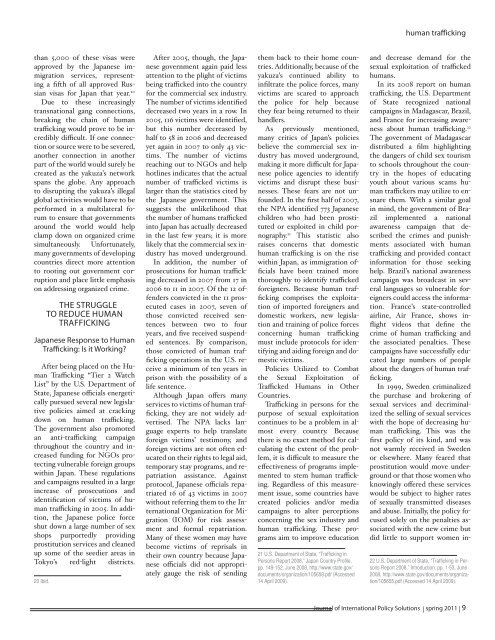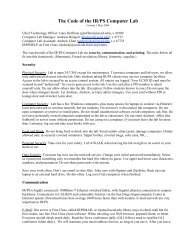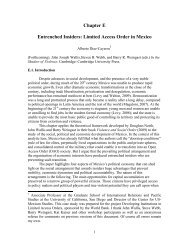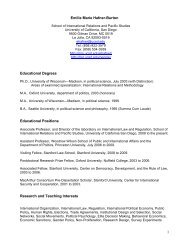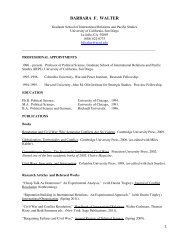to download the full journal. (1.2MB PDF) - School of International ...
to download the full journal. (1.2MB PDF) - School of International ...
to download the full journal. (1.2MB PDF) - School of International ...
Create successful ePaper yourself
Turn your PDF publications into a flip-book with our unique Google optimized e-Paper software.
human trafficking<br />
than 5,000 <strong>of</strong> <strong>the</strong>se visas were<br />
approved by <strong>the</strong> Japanese immigration<br />
services, representing<br />
a fifth <strong>of</strong> all approved Russian<br />
visas for Japan that year. 20<br />
Due <strong>to</strong> <strong>the</strong>se increasingly<br />
transnational gang connections,<br />
breaking <strong>the</strong> chain <strong>of</strong> human<br />
trafficking would prove <strong>to</strong> be incredibly<br />
difficult. If one connection<br />
or source were <strong>to</strong> be severed,<br />
ano<strong>the</strong>r connection in ano<strong>the</strong>r<br />
part <strong>of</strong> <strong>the</strong> world would surely be<br />
created as <strong>the</strong> yakuza’s network<br />
spans <strong>the</strong> globe. Any approach<br />
<strong>to</strong> disrupting <strong>the</strong> yakuza’s illegal<br />
global activities would have <strong>to</strong> be<br />
performed in a multilateral forum<br />
<strong>to</strong> ensure that governments<br />
around <strong>the</strong> world would help<br />
clamp down on organized crime<br />
simultaneously. Unfortunately,<br />
many governments <strong>of</strong> developing<br />
countries direct more attention<br />
<strong>to</strong> rooting out government corruption<br />
and place little emphasis<br />
on addressing organized crime.<br />
THE STRUGGLE<br />
TO REDUCE HUMAN<br />
TRAFFICKING<br />
Japanese Response <strong>to</strong> Human<br />
Trafficking: Is it Working?<br />
After being placed on <strong>the</strong> Human<br />
Trafficking “Tier 2 Watch<br />
List” by <strong>the</strong> U.S. Department <strong>of</strong><br />
State, Japanese <strong>of</strong>ficials energetically<br />
pursued several new legislative<br />
policies aimed at cracking<br />
down on human trafficking.<br />
The government also promoted<br />
an anti-trafficking campaign<br />
throughout <strong>the</strong> country and increased<br />
funding for NGOs protecting<br />
vulnerable foreign groups<br />
within Japan. These regulations<br />
and campaigns resulted in a large<br />
increase <strong>of</strong> prosecutions and<br />
identification <strong>of</strong> victims <strong>of</strong> human<br />
trafficking in 2005. In addition,<br />
<strong>the</strong> Japanese police force<br />
shut down a large number <strong>of</strong> sex<br />
shops purportedly providing<br />
prostitution services and cleaned<br />
up some <strong>of</strong> <strong>the</strong> seedier areas in<br />
Tokyo’s red-light districts.<br />
20 Ibid.<br />
After 2005, though, <strong>the</strong> Japanese<br />
government again paid less<br />
attention <strong>to</strong> <strong>the</strong> plight <strong>of</strong> victims<br />
being trafficked in<strong>to</strong> <strong>the</strong> country<br />
for <strong>the</strong> commercial sex industry.<br />
The number <strong>of</strong> victims identified<br />
decreased two years in a row. In<br />
2005, 116 victims were identified,<br />
but this number decreased by<br />
half <strong>to</strong> 58 in 2006 and decreased<br />
yet again in 2007 <strong>to</strong> only 43 victims.<br />
The number <strong>of</strong> victims<br />
reaching out <strong>to</strong> NGOs and help<br />
hotlines indicates that <strong>the</strong> actual<br />
number <strong>of</strong> trafficked victims is<br />
larger than <strong>the</strong> statistics cited by<br />
<strong>the</strong> Japanese government. This<br />
suggests <strong>the</strong> unlikelihood that<br />
<strong>the</strong> number <strong>of</strong> humans trafficked<br />
in<strong>to</strong> Japan has actually decreased<br />
in <strong>the</strong> last few years; it is more<br />
likely that <strong>the</strong> commercial sex industry<br />
has moved underground.<br />
In addition, <strong>the</strong> number <strong>of</strong><br />
prosecutions for human trafficking<br />
decreased in 2007 from 17 in<br />
2006 <strong>to</strong> 11 in 2007. Of <strong>the</strong> 12 <strong>of</strong>fenders<br />
convicted in <strong>the</strong> 11 prosecuted<br />
cases in 2007, seven <strong>of</strong><br />
those convicted received sentences<br />
between two <strong>to</strong> four<br />
years, and five received suspended<br />
sentences. By comparison,<br />
those convicted <strong>of</strong> human trafficking<br />
operations in <strong>the</strong> U.S. receive<br />
a minimum <strong>of</strong> ten years in<br />
prison with <strong>the</strong> possibility <strong>of</strong> a<br />
life sentence.<br />
Although Japan <strong>of</strong>fers many<br />
services <strong>to</strong> victims <strong>of</strong> human trafficking,<br />
<strong>the</strong>y are not widely advertised.<br />
The NPA lacks language<br />
experts <strong>to</strong> help translate<br />
foreign victims’ testimony, and<br />
foreign victims are not <strong>of</strong>ten educated<br />
on <strong>the</strong>ir rights <strong>to</strong> legal aid,<br />
temporary stay programs, and repatriation<br />
assistance. Against<br />
pro<strong>to</strong>col, Japanese <strong>of</strong>ficials repatriated<br />
16 <strong>of</strong> 43 victims in 2007<br />
without referring <strong>the</strong>m <strong>to</strong> <strong>the</strong> <strong>International</strong><br />
Organization for Migration<br />
(IOM) for risk assessment<br />
and formal repatriation.<br />
Many <strong>of</strong> <strong>the</strong>se women may have<br />
become victims <strong>of</strong> reprisals in<br />
<strong>the</strong>ir own country because Japanese<br />
<strong>of</strong>ficials did not appropriately<br />
gauge <strong>the</strong> risk <strong>of</strong> sending<br />
<strong>the</strong>m back <strong>to</strong> <strong>the</strong>ir home countries.<br />
Additionally, because <strong>of</strong> <strong>the</strong><br />
yakuza’s continued ability <strong>to</strong><br />
infiltrate <strong>the</strong> police forces, many<br />
victims are scared <strong>to</strong> approach<br />
<strong>the</strong> police for help because<br />
<strong>the</strong>y fear being returned <strong>to</strong> <strong>the</strong>ir<br />
handlers.<br />
As previously mentioned,<br />
many critics <strong>of</strong> Japan’s policies<br />
believe <strong>the</strong> commercial sex industry<br />
has moved underground,<br />
making it more difficult for Japanese<br />
police agencies <strong>to</strong> identify<br />
victims and disrupt <strong>the</strong>se businesses.<br />
These fears are not unfounded.<br />
In <strong>the</strong> first half <strong>of</strong> 2007,<br />
<strong>the</strong> NPA identified 773 Japanese<br />
children who had been prostituted<br />
or exploited in child pornography.<br />
21 This statistic also<br />
raises concerns that domestic<br />
human trafficking is on <strong>the</strong> rise<br />
within Japan, as immigration <strong>of</strong>ficials<br />
have been trained more<br />
thoroughly <strong>to</strong> identify trafficked<br />
foreigners. Because human trafficking<br />
comprises <strong>the</strong> exploitation<br />
<strong>of</strong> imported foreigners and<br />
domestic workers, new legislation<br />
and training <strong>of</strong> police forces<br />
concerning human trafficking<br />
must include pro<strong>to</strong>cols for identifying<br />
and aiding foreign and domestic<br />
victims.<br />
Policies Utilized <strong>to</strong> Combat<br />
<strong>the</strong> Sexual Exploitation <strong>of</strong><br />
Trafficked Humans in O<strong>the</strong>r<br />
Countries.<br />
Trafficking in persons for <strong>the</strong><br />
purpose <strong>of</strong> sexual exploitation<br />
continues <strong>to</strong> be a problem in almost<br />
every country. Because<br />
<strong>the</strong>re is no exact method for calculating<br />
<strong>the</strong> extent <strong>of</strong> <strong>the</strong> problem,<br />
it is difficult <strong>to</strong> measure <strong>the</strong><br />
effectiveness <strong>of</strong> programs implemented<br />
<strong>to</strong> stem human trafficking.<br />
Regardless <strong>of</strong> this measurement<br />
issue, some countries have<br />
created policies and/or media<br />
campaigns <strong>to</strong> alter perceptions<br />
concerning <strong>the</strong> sex industry and<br />
human trafficking. These programs<br />
aim <strong>to</strong> improve education<br />
21 U.S. Department <strong>of</strong> State, “Trafficking in<br />
Persons Report 2008,” Japan Country Pr<strong>of</strong>ile,<br />
pp. 149-152, June 2008, http://www.state.gov/<br />
documents/organization/105658.pdf (Accessed<br />
14 April 2009).<br />
and decrease demand for <strong>the</strong><br />
sexual exploitation <strong>of</strong> trafficked<br />
humans.<br />
In its 2008 report on human<br />
trafficking, <strong>the</strong> U.S. Department<br />
<strong>of</strong> State recognized national<br />
campaigns in Madagascar, Brazil,<br />
and France for increasing awareness<br />
about human trafficking. 22<br />
The government <strong>of</strong> Madagascar<br />
distributed a film highlighting<br />
<strong>the</strong> dangers <strong>of</strong> child sex <strong>to</strong>urism<br />
<strong>to</strong> schools throughout <strong>the</strong> country<br />
in <strong>the</strong> hopes <strong>of</strong> educating<br />
youth about various scams human<br />
traffickers may utilize <strong>to</strong> ensnare<br />
<strong>the</strong>m. With a similar goal<br />
in mind, <strong>the</strong> government <strong>of</strong> Brazil<br />
implemented a national<br />
awareness campaign that described<br />
<strong>the</strong> crimes and punishments<br />
associated with human<br />
trafficking and provided contact<br />
information for those seeking<br />
help. Brazil’s national awareness<br />
campaign was broadcast in several<br />
languages so vulnerable foreigners<br />
could access <strong>the</strong> information.<br />
France’s state-controlled<br />
airline, Air France, shows inflight<br />
videos that define <strong>the</strong><br />
crime <strong>of</strong> human trafficking and<br />
<strong>the</strong> associated penalties. These<br />
campaigns have success<strong>full</strong>y educated<br />
large numbers <strong>of</strong> people<br />
about <strong>the</strong> dangers <strong>of</strong> human trafficking.<br />
In 1999, Sweden criminalized<br />
<strong>the</strong> purchase and brokering <strong>of</strong><br />
sexual services and decriminalized<br />
<strong>the</strong> selling <strong>of</strong> sexual services<br />
with <strong>the</strong> hope <strong>of</strong> decreasing human<br />
trafficking. This was <strong>the</strong><br />
first policy <strong>of</strong> its kind, and was<br />
not warmly received in Sweden<br />
or elsewhere. Many feared that<br />
prostitution would move underground<br />
or that those women who<br />
knowingly <strong>of</strong>fered <strong>the</strong>se services<br />
would be subject <strong>to</strong> higher rates<br />
<strong>of</strong> sexually transmitted diseases<br />
and abuse. Initially, <strong>the</strong> policy focused<br />
solely on <strong>the</strong> penalties associated<br />
with <strong>the</strong> new crime but<br />
did little <strong>to</strong> support women in-<br />
22 U.S. Department <strong>of</strong> State, “Trafficking in Persons<br />
Report 2008,” Introduction, pp. 1-53, June<br />
2008, http://www.state.gov/documents/organization/105655.pdf<br />
(Accessed 14 April 2009).<br />
Journal <strong>of</strong> <strong>International</strong> Policy Solutions | spring 2011 | 9


